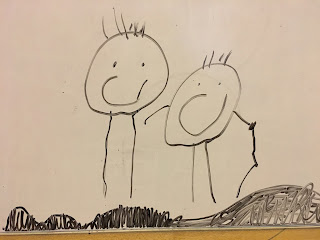Jesus was upset
(At bedtime, 4 yo flipping through a book about the Easter story)
4 yo: Why Jesus just didn't go straight up to heaven?
Me: Oh, you mean instead of dying on the cross? Like, he could have just gone straight up to heaven?
4 yo: Yeah!
Me: That is a great question. What do you think?
4 yo: To show him powers.
Me: Ah, do you mean so he could come back to life and show power that way? (4 yo nods) Well, that is a good point.
4 yo: Mom?
Me: Yes, baby.
4 yo: I think Jesus was sad and upset.
Me: Upset?
4 yo: Yeah, I think Jesus was upset because he died.
Me: Well, yeah, that is another good point.
Secret parenting worry: what if my kids grow up to be big jerks? My spouse and I do our best to show and teach and our children about kindness, care for others, compassion and empathy, but parenting is generally a leap of faith and hope. You don't get to pick who your kids become.
My kids have been squabbling more since the pandemic hit; they've never spent this much time together and the physical fights and name-calling have increased. I worry, lying awake in bed at night, how this season will impact them. How is our ongoing hunkering affecting them socially? Are we stunting their emotional development? Will they be big jerks? I hope not. My 4-year-old's empathy for Jesus' feelings felt like a little ray of hope.
This reflection is about empathy, though the above conversation could lead naturally to a discussion of atonement theory. But I did that recently in a blog post after a chat with the 7-year-old theologian. Atonement theory can sit this one out tonight, in favor of empathy.
An article on the Psychology Today website says that empathy is "the ability to recognize, understand and share the thoughts of another person, animal or fictional character." It's about seeing things from another's point of view. The article also notes that empathy is declining in the United States today. I wonder how one can prove this statistically, though I see it anecdotally in increased political polarization and demonization of those who vote differently. Have you seen a Facebook meme inviting you to compassion and empathy for someone who doesn't vote as you do?
I was recently having a conversation with a friend who votes differently than me and I was truly surprised by assumptions made about me. It was sort of fun to shatter those, I'll be honest, yet I also gained insight into and empathy for my friend's perspective. Empathy comes naturally, in a way, as we're wired for it, but it's also a muscle that needs practice, repetition and regular use.
I don't remember being taught empathy, but I picked it up. My mom regularly phoned and visited shut-ins from our church, and came bearing hot dishes to homes where someone had died. I heard stories in church about loving others, including the outsiders. I was a voracious reader as a child and loved stories about characters from other countries or places I'd never been. Somehow, I learned to see others' points of view. Empathy to me feels holy. It's a Christ-like act of selfless love to look at a situation in a new way. Empathy acknowledges the image of God in the other.
There are many ways to practice empathy with children. We try to point out feelings of characters when we read books (how do you think Pooh felt here?) and when we talk about the actions of others (I wonder if your brother was feeling jealous when he grabbed your toy?). Reading books with diverse characters and heroes is also helpful. For more, here's an article about teaching empathy at different ages and stages in child development. To those with children at home or in your life, how do you teach them about empathy? How do you model it? What have you learned about empathy?



Such good guidance about kids learning empathy by seeing it in action and receiving it from others. And for adults, I believe that true empathy comes when we recognize that I could just as easily be that “other” person; I am not “above” hate, greed, abusive behavior, violence, selfishness, or any other action or feeling that causes people and the earth pain and death. On our best days we know it’s true, which is why we hope and and pray our children will live compassionate lives and.trust Jesus loves them and their neighbors all at the same time.
ReplyDeleteThank you again Lisa for wise and hopeful good news.
Thanks for reading and responding, Ramona! I appreciate your comments on humility...so important these days!
DeleteI imagine your children will likely be compassionate and empathetic people, just like their parents, but those parental worries make total sense! Yes, we need to exercise our empathy muscles, and good for you for doing that with your friend who has different political views!
ReplyDeleteThank you, Jamie! Framing things as a workout is personally helpful to me :)
Delete